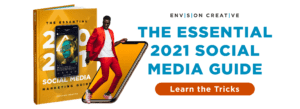Whether you sell snow cones or jet planes you need an SEO strategy. Search traffic numbers, lead generation, prospect education, and brand visibility all need an SEO to succeed. But SEO is usually the last thing that gets attention in a marketing strategy. Why? Some people are afraid to tackle it and some are just not sure where to start.
In today’s post, we’re going to cover the things you need to know to get your SEO strategy started and providing real results.
10 SEO stats (and some context) to make you a HERO!
SEO, Search Engine Optimization, is the method by which you increase the quality and quantity of traffic to your website through non-paid search engine results.
Now that you know what SEO is (well, in general, at least!), here are some statistics along with some context to help you take your awesomeness to the next level and come up with some pretty stellar strategy for your business:
- 39% of global traffic comes from search – 35% of which is organic and 4% of this is SEM (paid search/search engine marketing). (Source)
Organic traffic is a term, like SEO, that you hear all the time. For those of you that need a quick heads up: organic traffic is the traffic that comes to your site via a non-paid listing on search engine results. Organic traffic numbers are important for a few reasons:
- Search engines eat it UP! If a search engine like Google sees that you have a lot of organic traffic hits on your site, it knows that you are in a good SEO neighborhood. The more hits, the higher in the SERPs (Search Engine Rankings Page) you go!
- It’s FREEEEE. But not really. While you don’t PAY to rank organically you do pay in time and effort to create native content on your site that is optimized and engaging so it performs well organically (re: it shows up in a lot of searches and gets a lot of clicks!). BUT unlike SEM ( search engine marketing), you don’t pay for these rankings. You earn them by good ol’ hard work!
- It shows you’re better than your competition. Showing up ahead of your rivals in the SERPs is one of the best signs of success! You’re ranking for the same keywords but you’re ranking BETTER. What a wonderful feeling it is to be shown above all others. It establishes brand authority and lets users know your content is better than competitors.
- You get better and more engaged visitors. Ranking high in the SERPs for your keywords means a nice, steady stream of visitors to your site. This also means search engines continue to see you as a relevant and active member of the digital community and you get to stay on their Good List (Google may or may NOT have a Good List like Santa, but I like to assume that they do).
There are far more benefits to gaining high organic traffic than what is listed above … but we don’t have all day to write and you don’t have all day to read. Let’s move on to the next stat!
- 93% of online experiences BEGIN WITH SEARCH. (Source)Hi, hello. Did you read that? Ninety-three percent. That’s almost 100%, you guys. That’s a lot of percents. Because we know now that 39% of global traffic on the internet comes from search and 35% of that search is organic, this stat is even COOLER.Basically, this means that people are searching for things. They may not know exactly what they need at first, but they know they need SOMETHING. So, when you rank for SOMETHING through your careful and thoughtful SEO strategy, you get to be seen by SO MANY MORE PEOPLE.
Remember 93%. Not to understate: That’s a lot.
- 70-80% of search engines users skip paid ads and go straight to organic results. (Source)Let me be clear: As an SEO lover I love this stat but as a PPC (pay per click) advocate I also hate this stat. PPC is important, don’t get me wrong and should be a part of your overall strategy but you can’t argue with a habit that affects 70-80% of search engine users.To put this into perspective: It’s estimated that about 1.17 BILLION people use Google search. So…yeah, let’s do some quick math. Calculator noises: that’s 819,000,000 people.
819 million people see those paid ads and say, “No thanks!” and skip straight to the organic results. SO, while paid is still important (and we’ll get to those statistics in another post!), your organic search results are MEGA-SUPER-DUPER-IMPORTANT.
- Google has 80% of the total search engine marketing share. (Source)If I did my math correctly, and it has been confirmed that I did: knowing that Google accounts for 80% of the search market at 1.17 billion users. This means that, overall, there1, 462, 500,000 worldwide—that’s one billion, four hundred sixty million, five hundred thousand users.
The top three search engines are Google, Bing, and Yahoo (no, really—but it’s odd because Yahoo is actually powered by Bing). It’s safe to say that keeping up with Google best practices is the way to go. Bing/Yahoo are ok, too…probably.
- 57% of B2B marketers say that SEO generates MORE leads than any of their other marketing disciplines. (Source)As both a B2B and a B2C marketer I can confirm that’s true! Now, don’t think this is all just putting keywords on a page. This is the result of excellent content creation which, again, is not free! If it’s in-house creation, it’s still taking payroll hours to create and if you work with an agency it’s a paid service. But, as we’re learning: it’s an incredibly important service. A service that helps you get seen by Google (the favored search tool of 1.17 billion people).
- 47% of users look through 3-5 pieces of a company’s native content before they reach out to sales. (Source)Native content is content that your company wrote on its own steam and published on your site. This isn’t always blog posts, though they help! Go through your site and make sure your pages are informative and robust—do they answer questions for prospects in all parts of their buyer’s journey? Does content need to be updated? Are there any special white papers, guides, or studies for them to review to get them ready to convert?If your content is lacking, that’s also hurting your search results, too, so content marketing should be a must for your digital marketing strategy!
- 10% of all searches are voice searches. (Source)“Alexa—”
“Siri—”
“Ok, Google—”
More and more devices are enabled with AI assistants and that 10% is going to be increasing dramatically over the next five years. How do you account for voice search when you’re planning keywords? Think about the fundamental difference between how we type and how we talk:
-
- Searchers have been trained to be more specific and shorter when typing out our internet searches. We often search using a few words or a short phrase.
- With voice search, we tend to ask longer questions and in a more conversational tone.
See the difference? While we can’t really tell right now with the tools we (marketers) have available what is from voice and what is from text, we can start to look at our queries and divine some answers.
For example, a lot of your voice queries will probably come from mobile as most smartphones utilize an AI assistant for just this occasion.
I could, quite literally, write about this all day and don’t be surprised if you see an entire blog post dedicated to this in the future. But for now, I’ll let Neil Patel say it –so, when you’re done reading this post, check out his blog post on voice search here.
-
- 78%of location-based mobile searches result in an offline purchase. (Source)That’s right! Think about the stat we saw earlier: 93% of online experiences begin with search. We know that search is a major food group in our digital diet and we search a LOT on our phones—it only stands to reason that we’re not just searching for online experiences, we’re looking for things near us.
This is important for a lot of reasons: If your SEO is not up to date—you’re missing out on those search results and thus missing out on sales. Regardless of industry, you should make sure your Google My Business page is up to date! Google is moving away towards website-linked search results (don’t get me started), so that GMB page can be a lifeline between people finding and spending with your business or losing out to a savvier competitor.Not sure how to get your GMB page started and/or optimized? Check out our post on it here!
- 50% of search queries are four words or longer. (Source)Longtail keywords, or keyword phrases with three or more words in it (“digital marketing firm” “ice cream near me”), have gained prominence (think there’s a connection to voice search?). This means that if your SEO focus is still on single keywords you’re missing out. Longtail phrases are awesome for a few reasons but here are the top 2:
- They’re often less competitive
- If you use them for PPC, they’re often less expensive
But how does a less competitive keyword make a good strategy? For one, you can rank faster for it organically because your competitors may be focusing on something else. Secondly, people are obviously searching for these terms! This means you can show up in more searches and higher in those searches by adding these longtail keywords to your strategy.
Just be sure you have a few variations, so your content doesn’t read like a robot wrote it “Hello, I am a human that enjoys DIGITAL MARKETING FIRMS. Don’t you love when a DIGITAL MARKETING FIRM does good work at a great price? This is why it is important for DIGITAL MARKETING FIRMS to build brand authority.”
Nobody wants to read that (or write it—honestly, writing that gave me minor sweats) and Google doesn’t want to serve it. So, be sure you have a few variations, so your writing is more natural: Digital marketing firms, marketing firms, firms for digital marketing. Do your research!
- 61% of marketers say improving SEO and growing organic presence is their top inbound marketing priority. (Source)After the other stats, I’m not sure you need TOO much context for this one. 93% of internet experiences begin with search, organic SEO strategy is free (re: you don’t have to pay for rankings and results unless you bring in outside help), 1.17 billion people use Google because it generates more leads—IT GENERATES MORE LEADS.
I’m sorry for shouting, I’m just excited and this is an important thing, and maybe the most important point. Lead generation is a need you have, regardless of industry, whether you sell snow cones or jet planes.
SEO is a universal need for all businesses, so get your thinking caps on and start your updated SEO strategy today!
-FINAL(01-00)-White&Blue-01.svg)





